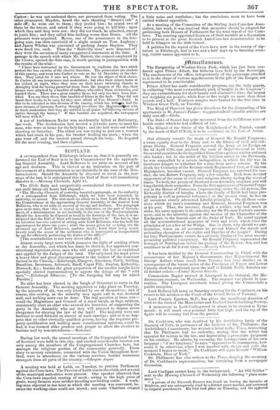SCOTLAND.
A correspondent from Edinburgh informs us, that it is generally un- derstood the Earl of Stair is to be the Commissioner for the approach- ing General Assembly. Lord Belhaven is set aside on account of his age and deafness. This is viewed as an indication on the part of Government of a determination to act decidedly in the case of the Non- intrusionists. Should the Assembly be disposed to tread in the foot- steps of the last, it is anticipated that the Earl of Stair will immediately dissolve it.—Morning Chronicle, April 13.
The Globe flatly and categorically contradicted this statement, b at not until thirty-six hours had elapsed— "The Morning Chronicle of yesterday inserted a paragraph, on the authority of a correspondent from Edinburgh, which we have been requested, by authority, to correct. The statement we allude to is, that Lord Stair is to be the Commissioner at the approaching General Assembly, in the stead of Lord Belhaven, who is set aside on account of his age and deafness. The paragraph goes on to state, that this is viewed as an indication, on the part of Govern- ment, of a determination to act decidedly in the case of the Nonintrusionists. Should the Assembly be disposed to tread in the footsteps of the last, it is an- ticipated that the Earl of Stair will immediately dissolve it.' The fact is, that no intention has ever existed of setting aside Lord Belhaven, who has held the appointment for above ten years ; while the reason given for so doing, viz, the advanced age of Lord Belhaven, confutes itself; Lord Stair being nearly twenty years the senior of the nobleman who is represented as incapacitated by age for efficiently performing the duties of the office !" [The contradiction is not very direct after all.] Almost every large town which possesses the right of sending elders to the Assembly, and which has made its election, has appointed con- stitutional representatives, men who will support the law as explained and applied by the Judges of the land. The subjoined list must prove a heavy blow and great discouragement to the leaders of the dominant faction in the Church,—Edinburgh, Glasgow, Aberdeen, Perth, Stirling, Dumfries, Inverness, Arbroath, Banff, Cupar Fife, Dunbar, Kirkcaldy, Dornoch, &c.; besides the great proportion of the smaller burghs have specially elected representatives to oppose the doings of the " wild men."—Edinburgh Observer. [To the foregoing list may be added Dundee.] No elder has been elected in the burgh of Stranraer to serve in the General Assembly. The meeting appointed to take place on Tuesday, 1;oy the minority of six, was only attended by one of themselves ; and of course, this meeting, as the minority may again call it, was declared null, and nothing more can be done. The real question at issue was- -could the Magistrates and Council of a royal burgh, as liege subjects, consistently elect an elder who avowed his intention of supporting the party in the Assembly who say they will proceed to depose seven clergymen for obeying the law of the land ? The majority were not inclined to send forward an abettor of such cantrips ; and as it so hap- pens that no other clerically-qualified person, having the requisite pro- perty-qualification and holding more constitutional opinions, could be had, it was deemed alike prudent and proper to allow the election to become null by non-attendance.—Scotsman.
During last week, the annual meetings of the Congregational Union of Scotland were held in this city, and excited considerable interest not only among the members of the Congregational Churches here, but amongst the religious portion of the community generally. From sixty to seventy ministers, connected with the Union throughout Scot- land, were in attendance on the various services, besides numerous strangers from all parts of the country.—Glasgow Argus.
A meeting was held at Leith, on Tuesday, to petition Parliament against the Corn-laws. The Provost of Leith was in the chair, and several ofthe municipal authorities were present. One speaker observed that the Corn-laws impeded rearing of stock : owing to the high price of grain, many farmers were neither breeding nor feeding cattle. A work- ing-man objected to the hour at which the meeting was convened, be- cause the working-class could not attend; and some Chartists created a little noise and confusion ; but the resolutions seem to have been carried without opposition.
At a meeting of the Committee of the Stirling Anti-Corn-law Asso- ciation, last week, it was resolved that measures should be adopted for petitioning both Houses of Parliament for the total repeal of the Corn- laws. The meeting appointed fourteen of their number as a deputation to be present at the great Scottish Anti-Corn-law demonstration to be held in Glasgow on the 20th instant.
A petition for the repeal of the Corn.laws, now in the course of sig- nature in Edinburgh, had in two and a half days up to Saturday even- ing, 10,000 names appended to it.


























 Previous page
Previous page